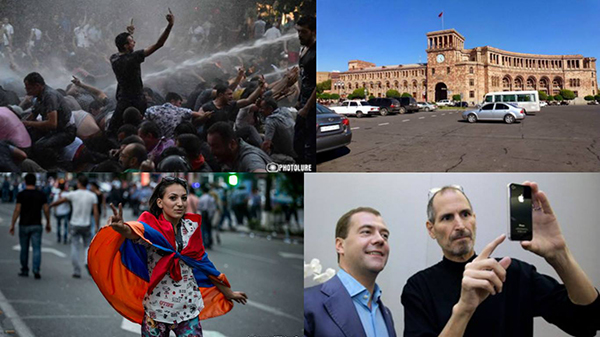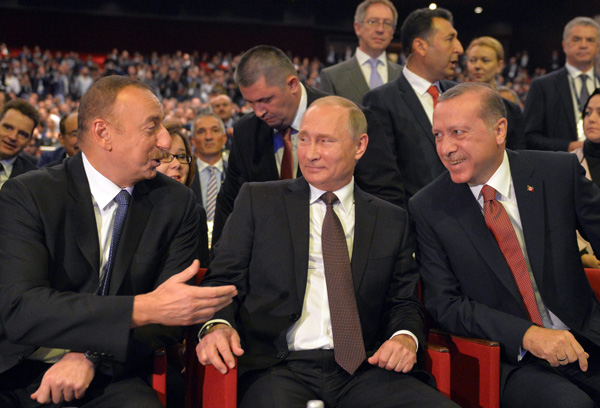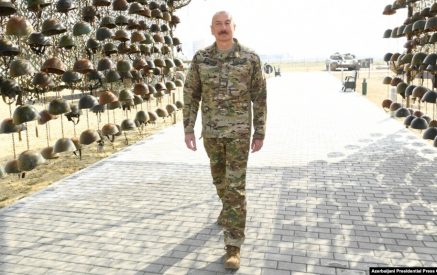Our strategic ally Russian President Vladimir Putin spares no effort trying to convince the West to restore the relations with his country. At the same time, he is not ready and cannot be ready for any move that will be directed to any significant systemic change in his country. This means that it is not possible also to talk about the change in the foreign policy strategy.
The regular International Economic Forum was kicked off recently in St. Petersburg, which was attended by a number of high-ranking and influential persons: President of the European Commission Jean-Claude Juncker, the UN Secretary-General Ban Ki-moon, Italian Prime Minister Matteo Renzi, as well as the most prominent representatives of the world business and intellectual elite: President of “Boeing” corporation Mark Allen, professor of the Massachusetts Institute of Technology (MIT) Lauren Graham and others.
Not only two ideologies but two ages clashed in the intellectual field: free and man-centered, conventionally “Western” mindset of the 21st century and authoritarian, government-centered, human-priority denying, conventionally “Russian.” Yes, conventionally, as the same “Russian” system gives also birth to Andrey Sakharov and Yuri Afanasiev, and also Hitler and Breivik in the “West.”
Certainly, the St. Petersburg meeting had a strong political context, which is long ago known and unchanging. Although Russian President Putin made a statement sounding strange to the imperialistic ear, saying, “America is a great power today probably the only superpower” and “we accept that”, however, he also said, “we don’t need them constantly getting mixed up in our affairs, instructing us how to live, preventing Europe from building a relationship with us”.
Read also
According to the release, RA former Prime Minister, former RA Ambassador to the United States Tigran Sargsyan was also advocating “instead building walls, build bridges”, without particularly getting to know what walls, for what reasons and who is building. It is clear that the US cannot “prevent” Europe unless Europe with its half a billion population considers Russia a treat. Extending the tough sanctions against Crimea for another year, in the coming days, Europe will extend the sanctions against Russia for six more months. Hence, no one was impressed by the rhetoric, and generally, in the 21st century, only the results are impressing. Professor Lauren Graham expressed remarkable ideas about the results, which according to the commentators simply “exploded” the hall, though basically, there was nothing new there. He just asked a simple question: What prevents the wonderful ideas that are born in Russia to be introduced and sold? And the answer to this question is not the lack of talent with Russians, on the contrary, Russian specialists are wonderful professionals. The answer is that Russia failed to build a society where the brilliant achievements of the citizens can find an outcome in the economic development.
All Russian leaders, says the professor, starting from socialism to our days, have considered that the answer to the problem of modernization is in the technologies rather than the social and economic environment that contributed to the development and commercialization thereof. The success key to MIT is not in its own culture but in Boston’s and generally, the US culture. What cultural secrets are they that allow the ideas to turn from business views into successful ventures? And Lauren Graham gives the simple answer to this question: a democratic system of governance, a free market where the investors need new technologies, intellectual ownership protection, control over corruption and crime, a legal system where the defendant has the opportunity to prove his innocence. This culture allows critical expressions, freedom, there you can fail to try again.
Currently, says the US professor, Russian leaders are trying to implement modernization but alas by the course of their predecessors, they are trying to separate technologies from social and political systems. They say that they support Skolkovo, the valuable clone of the Silicon Valley, but at the same time, continues Graham, seeking forgiveness they ban rallies, oppress political opponents and entrepreneurs who have accumulated enough power to send a challenge to them. They signed laws that blame the Russians for their cooperation with others, as well as support the authoritarian regimes. Such a policy cannot result in the development of a society where risky entrepreneurs and innovators are prospering. Such a policy can only result in a society where people are losing their heads fearing the punishment. For them, modernization, unfortunately, means acquiring new technologies by giving up with the economic and other principles that advance these technologies and reach success in some other places. “They need milk without a cow,” – concludes Lauren Graham …
… During his term as Prime Minister, the same Tigran Sargsyan was also speaking about the “knowledge-based” economy, high-tech, also Hovik Abrahamyan was speaking about the same things.
But, let us repeat that words do not impress anyone, the results are impressive. And the results are known. Handing over the leverages of making political decisions to the Russian state in key areas: security, defense policy, foreign policy, economy, import, export, customs and tax policy, in exchange, Armenia has received the whole complex of internal flaws of the “Russian” system: oligarchy, corruption, business and politic coalescence, monopolies, state arbitraries against business and citizens and so on. Of course, fortunately, life has shown that Armenia is not Russia and will not become a Russia. No matter how our opposition and defiant entrepreneur it tried to break with tax-CES-investigator-prosecutor-police officer, nevertheless, Armenia is strong with its society.
Over 15000 specialists are working in the IT sector in Armenia who are not dependent on the state, the government and their “loved ones.” Most of them are young people, and their success, incidentally, not only professionally but, why not, in the political sphere is still ahead. However, the same danger exists here too: Does this circle have the conscious that their professional advancement would become impossible in Armenia without radical social and political changes, or they will also have to emigrate. Therefore, without a clear formulation of the political interest, the “institutionalization” and further fulfillment of these interests, Armenia will not go ahead to the future from the current “interim” situation. Moreover, being opposite, it will hamper not only their professionalism but will also make the whole state directly sink into the swamp of backwardness for decades. After all, we cannot wait for our strategic ally to be willing to step in line with the century, or generally, will it be willing or not in the event when the world is developing with growingly speedy paces.
In addition to the significant reduction in the country’s sovereignty and the negative trends in this direction until now, it is also essential that the domestic political interests with significant part of the authorities, especially with the criminal- and oligarchic-thinking segment, as well as by the example and resemblance of the “big bro,” the temptation is great to continue the practice of raw materials quoted and unsparingly looting under the smog “knowledge-based” rhetoric, by maintaining, as MP Nikol Pashinyan said, the oligarchic grounds of “tomato-based” economy. Just look at and listen to our “knowledge-based” lawmakers and the government without comments … If during the Soviet period, the statements and the practice of this-and-that leaders of the country about the course of “socialism” were arising enthusiasm with extreme old-age USSR politburo dogmatic members, while it is a deviation from the course, let’s say, by the example of Czechoslovakia, an anger up to invasion, then the current Russia’s lack of ideology, materialistic elite does not burden itself with some ideological conventions. But here, the watershed between insider and outside is “ideological” at its own: the more anti-liberal, anti-Western, corrupt, criminalized and oligarchic, the more “insider”. And the step back from these “values” is also perceived hostile in today’s’ Moscow, up to the invasion, like, let’s say, in Georgia or Donbass, described as “Russophobia” or “being sold to the State Department” or simply a “fascism.”
Professor Graham’s assessments, unfortunately, are equally related to Armenia, its social and political system, the defects of this system, as well as to the government authorities, which at least formally is responsible for all this.
And if Russia would collapse by the USSR footsteps as a result of its all public “experiments”, Armenia, if it continues to follow the example of Russia, will result just staying under these ruins. Hence, we must realize a day before that this historically dooms “Russian” system is vitally anti-indicated to the Republic of Armenia, and it represents number one threat to the future existence of our statehood.
A number of political parties and political initiatives in Armenia realize these dangers as of today and cooperate with politically active circles of the IT industry, by building ambitious plans, in a positive sense, ahead of the 2017 elections. Despite the positive trends, however, it must be said that the scales of these activities are not sufficient to make qualitative changes visible. Whether Russia and its leadership traditionally cut off from the society will accept the US professor’s urging or not, it is up to them, while Armenia needs to “bear this in mind” just a day before, as we even do not have time to think longer.
Ruben MEHRABYAN























































